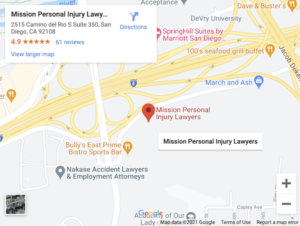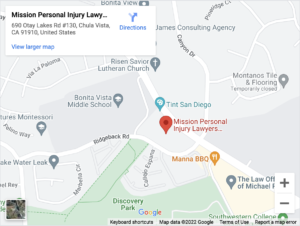
A concussion rarely causes permanent brain damage. But it can still produce serious symptoms that range from a headache to depression.
These symptoms can keep you from working for weeks or even months, depending on the severity of your concussion injury. They can also make you susceptible to another brain injury in a subsequent accident.
Here is an overview of the causes and symptoms of a concussion injury and the compensation you can collect for it.
Table of Contents
Your Skull and Brain
Your brain floats in cerebrospinal fluid (CSF) inside your skull. The skull protects your brain from impacts while the CSF cushions the brain and slows its motion. You can analogize the skull to a box and the CSF to bubble wrap.
In combination, the skull and CSF do a good job of protecting the brain. For minor jostling, the CSF slows down the brain and prevents it from hitting the inside of the skull. You might have a bump on your head but you will not get a concussion or another type of brain injury.
How a Concussion Injury Happens
A concussion happens when your brain sloshes in the CSF so violently that the pressure of the CSF squeezes the brain. When your head gets jostled in a car accident, a fall, or another traumatic event, the brain slides around in your skull.
If the brain hits the inside of the skull, you could develop a brain contusion. This bruise can trigger bleeding in the brain that kills brain cells. The bleeding can cause so much pressure on your brain that you may even end up in a coma.
To prevent this from happening, the CSF has a viscosity thicker than water. A concussion injury happens when the fluid resistance of the CSF damages brain cells.
The body triggers an inflammation response to deal with the damaged brain cells. The body causes the brain to swell and heat up. This traps any toxins or microorganisms in the damaged area and allows the immune cells and repair cells to remain in the area to heal the injury.
Concussion injury symptoms result from the brain cell damage combined with the swelling and warming of the brain.
The Causes of Concussion Injuries
Concussions result from the pressure of the CSF on the brain. This pressure can be caused by a few different types of trauma, including:
Head Trauma
A bump on the head can cause the brain to slosh around in the CSF. This sloshing can cause a concussion injury.
But bear in mind that this concussion did not result from the bump on the head. It resulted from the sloshing of your brain caused by a bump on the head. Thus, if you hit your head in a slip & fall accident, you could suffer an injury because the bump on the head could cause your brain to slosh in the CSF.
Rapid Acceleration and Deceleration
Rapid acceleration or deceleration will cause your brain to slosh inside your skull. A common example of an accident that can cause a concussion without head trauma is a car accident.
As your car collides with something, your brain wants to keep moving in the same direction at the same speed as before the collision. The CSF has to push on the brain to stop its motion.
Your body will whip around in the passenger compartment and you will eventually come to a stop. This whipping will cause your brain to move inside the CSF. In turn, the CSF pushes on the brain to slow it. Even if you do not hit your head in the accident, all this pressure on your brain can cause a concussion.
Blast Injury
An explosion creates a blast wave. This blast wave squeezes your body as it passes you. The blast wave can pressurize the CSF and squeeze your brain.
This injury is common in soldiers injured in combat explosions. But workers involved in industries that use explosives, like mining and demolitions, can also suffer from blast-related concussion injuries.
Symptoms of a Concussion Injury
Concussions can cause an array of physical, cognitive, and emotional symptoms, including:
- Headache
- Tinnitus
- Blurred vision or seeing stars
- Slurred speech
- Drowsiness
- Confusion or brain fog
- Amnesia
- Difficulty focusing
- Depression
- Anxiety
- Emotional outbursts
Not every accident victim will experience all of these symptoms. The symptoms you experience will depend on the severity of your concussion and the location of the brain injury.
Concussion symptoms frequently take time to manifest. The symptoms happen due to inflammation in the brain and other chemical changes to the damaged brain cells. This damage develops over time. After a concussion, you may experience new symptoms for hours or even days after the accident.
Most concussion symptoms disappear within two months. If your concussion symptoms last longer than two months, you may have post-concussion syndrome (PCS). PCS happens when concussion symptoms linger for months or even years beyond the typical two-month period.
Doctors do not know what causes PCS. But studies have identified a possible link between PCS and post-traumatic stress disorder (PTSD). If your accident was mentally traumatic, you might have a higher risk of developing PCS.
Getting Compensation for a Concussion Injury
You can seek injury compensation if you suffered a concussion due to someone else’s negligence. To prove negligence, you must prove that the other person or business failed to exercise reasonable care and this failure caused your injuries.
If you prove liability for your injuries, you can seek compensation for your economic and non-economic losses. Your economic losses include your medical bills, lost wages, diminished earning capacity, and other out-of-pocket expenses. You can prove your economic losses using bills, credit card and bank statements, and other financial records.
Your non-economic losses include all of the ways your concussion injury diminished your quality of life. Examples of non-economic losses include pain, suffering, inconvenience, and the inability to participate in activities. A jury can estimate your non-economic losses based on the severity and duration of your injuries.
Contact a San Diego Personal Injury Lawyer for Help
Getting a concussion could deprive you of many of the things that make you unique. Even if you do not have cognitive or emotional symptoms, you could still suffer from physical symptoms that prevent you from earning a living.
To discuss your losses and the compensation you can get for your concussion injury, contact Mission Personal Injury Lawyers for a free consultation. Our personal injury lawyers in San Diego, CA are standing by to discuss your claim.


